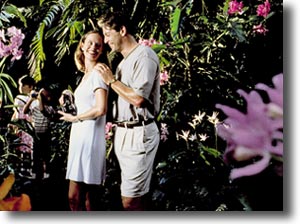|
Love in the Garden
(by Sam Torode)
 I’m a beginning husband and a beginning
gardener, which is to say about the same thing. I’m a beginning husband and a beginning
gardener, which is to say about the same thing.
Last May, I partitioned off a sunlit patch of grass outside our bedroom
window, turned over the moist, black earth, and sowed carrots, corn,
beans, and tomatoes. After a few weeks of watering, I knelt down one morning to find the first tender carrot plumes nudging up through the
soil. A year earlier, I had knelt close to feel the first faint tappings of my unborn son’s legs against his mother’s rounded
belly, like a goldfish bumping its nose on the walls of its tank. The seed was planted in the moist
darkness, and life sprang forth. Where there was nothing, a new life had come into
being.
What sustains the seed in the ground, the child in the womb? Pharaoh Amenhotep IV sang of this mystery in a hymn to
Aton:
All the beasts are content with their pasturage;
Trees and plants are flourishing. . . .
Creator of the seed in women,
Thou who makest fluid into man,
Who maintainest the son in the womb of his mother. . . .
How manifold it is, what thou hast made!
My first year of gardening, however, would not have given Amenhotep much to sing
about. The corn became infested with earwigs. Rabbits devoured the beans and carrots before I had sense to put in a
fence. At summer’s end, only the tomatoes thrived.
I have a lot to learn about husbanding a garden—and a wife. But I’ve found that the two roles complement each other in surprising
ways.
The task of the husbandman—and of every man and woman—is to
guard, nurture, and steward fertility with reverence, both our own fertility and the fertility of the
earth. According to ancient wisdom, fertility is a gift—a blessing—to be received with
joy.
This way of thinking runs contrary to just about everything our industrialized society tells us about
fertility. A young couple today, establishing a sexual bond, will most likely view their own fertility as a disaster waiting to
happen. They haven’t been taught to guard and tend to their fertility like a
garden. Instead, they’ve been instructed to “control” their bodies like
machines, suppressing their fertility with a regimen of drugs and
devices.
“For the care or control of fertility,” writes farmer and essayist Wendell
Berry, “we have allowed a technology of chemicals and devices to replace entirely the cultural means of ceremonial
forms, disciplines, and restraints.” It was through these cultural, or
ecological, means that our ancestors harnessed and preserved sexual
energy. These include the upholding of marriage as the ideal context for sex and the discipline of periodic abstinence for the spacing of
children.
In the ancient view, a human being is not a machine but a person—a unity of soul and
body. The wisdom of the past would caution us against artificially suppressing any part of the
person—including their fertility.
Health is wholeness. It involves being connected, living in harmony with our
bodies, our environment, and our fellow human beings. Industrialism,
however, tends toward division. Applied to sexuality, industrialism has fostered a separation between sex and
fertility, which, in turn, has lead to a separation between sex and
marriage.
“Until recently,” Berry continues, “there was no division between sexuality and
fertility, because none was possible. This division was made possible by modern
technology, which subjected human fertility, like the fertility of the
earth, to a new kind of will: the technological will, which may not necessarily oppose the moral
will, but which has not only tended to do so, but has tended to replace
it.”
My wife, with her cycle of fertility, is not a forest to be cleared or a mountain to be
strip-mined. Instead, she’s like a garden, yielding her fruits to the patience and care of the loving
husbandman. Neither are our potential children pests to be warded off with
chemicals. Instead, children are crowning gift of marriage, the visible fruits of a love too strong to be contained in just two
bodies.
Even so, at times it is prudent to avoid the gift of children, by exercising stewardship over our
fertility. Looking to the garden, we can see how to manage fertility in harmony with
nature. If you want a field to lie fallow, you refrain from planting seeds during the fertile
season. The same is true of our bodies—to avoid pregnancy, a couple can learn to follow the wife’s signs of
fertility, and avoid intercourse during the fertile time.
Like vegetable gardening, I’ve found “fertility gardening” to be
challenging—but the blessings that come from learning about our fertility far outweigh the
difficulties. As Mercedes Wilson writes in her guide to natural family
planning, Love and Fertility, “Discovering the beautifully created and delicately designed functions that govern a couple’s ability to conceive enhances the intimacy of marriage and deepens the love of husband and
wife.”
By striving to attune myself more closely to the cycles and rhythms of my wife’s
body, and to accept her fertility as a gift, I’m learning to become a better
husband—and a better gardener.
Sam Torode
www.openembrace.com
Sam Torode
102 W. Grove St.
South Wayne, WI 53587
(608) 439-1763
|
